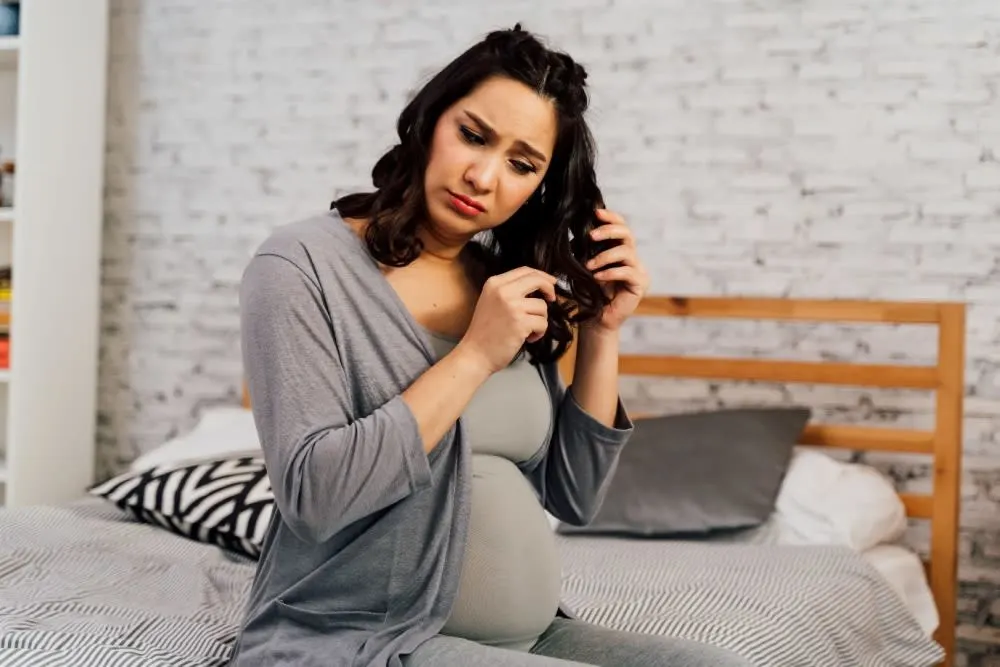How To Cure Dandruff During Pregnancy
Pregnancy is a precursor to the joys of motherhood. But it is an uphill battle and if dandruff makes an appearance, that climb becomes a lot steeper.
People talk about the glowing skin of a pregnant woman, but nobody really talks about the hair, which undergoes quite a transformation during pregnancy. Increased levels of Oestrogen lead to thicker and more full-bodied hair. You might even come across some compliments regarding the same. But post pregnancy this starts to unravel quite quickly with excessive shedding, although you don’t need to worry as it will simply return back to your pre-pregnancy look.
These hormonal changes can also play on with your scalp and hair, with dandruff being one of the common occurrences in pregnant women. But before we try to understand why, let’s understand what dandruff is.
What is Dandruff? Why do pregnant women develop dandruff? How to get rid of Dandruff?

What Is Dandruff?
It is a condition caused by a fungus called Malassezia Globosa, that breaks down the excess oil present on your scalp. One in two people is sensitive to the by-products that are created, and the body reacts in the form of red patches, itching and white flakes of dead skin cells.
Your scalp will always produce oil or sebum to protect your hair. The issue only comes up when there is excessive oil on your scalp, which is prime ground for the fungus to reproduce. There are various reasons for an increased presence of oil.
Why Do Pregnant Women Develop Dandruff?
The main culprit here is most likely the fluctuation in hormone levels. During pregnancy, your hormonal changes can send mixed signals to the scalp to increase oil production and to generate new skin cells. This excess oil can cause the fungus to grow, and when combined with the older skin cells that are replaced, it leads to hair dandruff.
During pregnancy your skin also becomes extremely sensitive. So products that you were using before, can start to irritate and cause a reaction on your skin. This can further aggravate your dandruff issues. In general, the immune response of the body is irregular to accommodate the growth of the foetus. Fungal infections can take hold in these scenarios and cause a disruption on your scalp.
How To Get Rid Of Dandruff?
First thing you need to do is consult a doctor as to the course of action. It is important that you move carefully so as to ensure that the products you use does not cause more issues. That being said, there are various home remedies for dandruff that you can employ yourself:
- Aloe Vera
This gooey goodness works wonders in calming an itchy scalp and dandruff during pregnancy and clearing off the oil that remains on your scalp. Its anti-inflammatory and anti-fungal properties have shown to significantly reduce the occurrence of dandruff during pregnancy, while moisturising at the same time. You can apply it directly or create a hair mask.
- Argan oil
Massaging essential oils like Argan oil, is a great way to reduce your dandruff inflammation and can also be relaxing. This boosts blood circulation to your scalp and adds a protective layer against heat. Argan oil is full of fatty acids and anti-oxidants that boost the health of your scalp and when combined with a gentle shampoo, can calm your dandruff due to its anti-fungal nature.
- Neem
Neem has been used as a traditional dandruff remedy in the form of pastes and solutions. It offers immediate relief from itching and has shown to significantly reduce the occurrence of dandruff during pregnancy. It has anti-bacterial, anti-inflammatory and anti-fungal properties, which combine to get rid of your ailment. You can even drink Neem juice for the same.
- Reduce stress
This time can be quite nerve wracking for you, with a hundred things to plan and take care of. And not just for the health of the baby but also for your scalp health, you need to reduce your stress levels. They add to the hormonal disruption that you’re facing and can cause a further spike of oil production on your scalp. Find moments to meditate in your day, even listen to music or watch a light movie. Whatever works to rid some of that tension.
- Diet
Your hunger pangs can lead you to the kitchen quite often during the day but adding healthy nutrients to your diet can significantly help with maintaining scalp health. Add zinc, fatty acids and vitamin A, B, C to your diet. Find nourishing ways to incorporate these into your eating.
- Avoid hair treatment and chemicals
The body becomes sensitive during the pregnancy and even aromas can be irritants. It is thus important to reduce the number of products that you use on your head. You never know what chemicals will react in what particular manner. Consult your dermatologist to understand what is healthy for your sensitive scalp.
- Hair care
Creating a better regimen of hair care can reduce the chances of dandruff. If you wash your hair regularly with the right kind of shampoos and conditioners, the underlying causes of dandruff would be taken care of. Try the Head and Shoulder Neem anti-dandruff shampooor the Head and Shoulders Supreme Scalp Soothingwith Argan oil and Aloe Vera, which bring the benefits of nature to your scalp.
Pregnancy can be a tricky path to navigate, and the last thing you want is to find yourself saddled with dandruff. But understand that this is a common occurrence and is temporary if you deal with it. Use the various solutions that are available to you, so that you can focus on how to take care of your bundle of joy.



